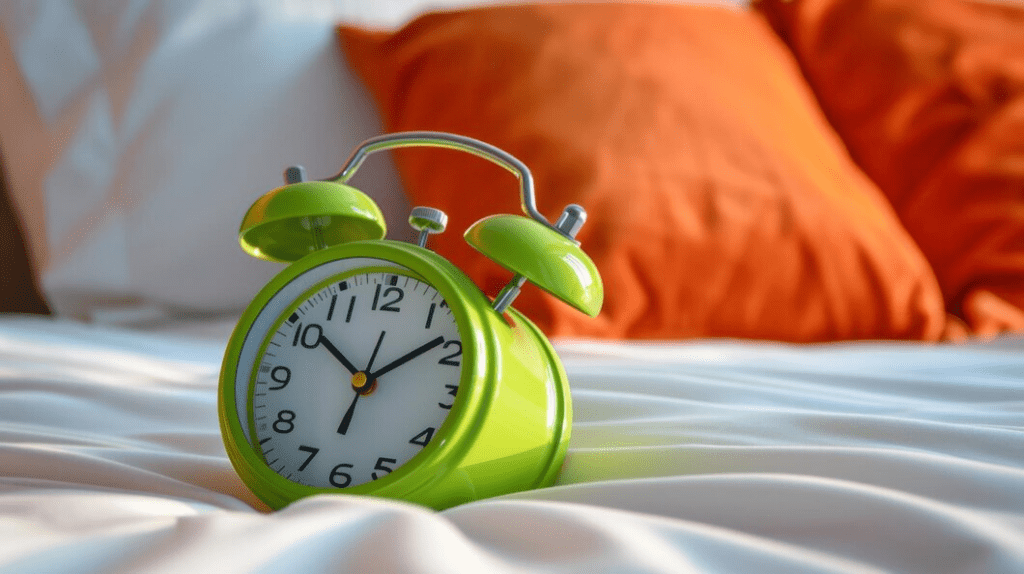Waking up early can be tough, especially when you’re still feeling tired. Many people struggle with this, but it doesn’t have to be so difficult.
With the right habits and a little consistency, waking up earlier can actually become something you look forward to, instead of something you dread.
The key is finding the right strategies that work for you. Small changes to your routine can make a big difference.
Whether it’s adjusting your bedtime or tweaking your morning habits, these little tweaks can help you feel more awake and refreshed.
Getting up early doesn’t mean sacrificing sleep or dragging through your day. It’s all about making sure your body gets the rest it needs and setting yourself up for success.
The good news is that waking up earlier can become easier with a few simple changes to how you approach sleep and mornings.
In this article, you’ll find 14 tips that can help you wake up earlier without feeling tired.
These tips are easy to follow and can make your mornings feel smoother and more energetic. Give them a try and see how they can transform your mornings!
1. Set a Consistent Bedtime
Getting up early starts the night before. One key thing is to set a consistent bedtime, not just on weekdays, but on weekends too.
Your body loves routines and finds it easier to adjust when you go to bed at the same time each night. That way, your sleep pattern becomes regular, and you’ll wake up feeling more rested.
Start by figuring out how much sleep you need to feel refreshed. Most people need around 7-9 hours, so work backwards from the time you want to wake up.
A good way to make this habit stick is by setting reminders to start winding down for bed.
That could mean turning off your devices, dimming the lights, or simply reading a book to relax.
Over time, your body will naturally start waking up earlier without feeling groggy. You’ll notice that consistent sleep leads to a lot less struggle getting out of bed in the morning.
It may take some time, but with a steady bedtime, you’ll eventually wake up before the alarm goes off.
2. Avoid Hitting Snooze

The snooze button may seem like a lifesaver, but it actually makes waking up harder.
Hitting snooze disrupts your sleep cycle and can leave you feeling groggier than before.
Each time you drift back to sleep, your body gets confused, making it harder to fully wake up when the alarm goes off again.
A better option is to set an alarm for the exact time you want to get up, then commit to getting out of bed when it rings. It’s tough at first, but you’ll notice the difference.
The more you avoid snoozing, the more alert you’ll feel right after waking up. Try placing your alarm on the other side of the room so you have to physically get up to turn it off.
You’ll soon find that getting up right away gives you more energy for the day ahead. No more dragging yourself through those extra five or ten minutes of sleep that leave you feeling more tired than before.
Your mornings will feel much more energized once you break the snooze habit.
3. Get Sunlight in the Morning
One of the best ways to wake up refreshed is by getting sunlight in the morning.
Sunlight signals your body that it’s time to be awake, helping regulate your internal clock.
Just stepping outside for a few minutes or opening your curtains can do wonders for boosting your energy levels.
If you can, spend some time outside shortly after waking up. Go for a quick walk, sit on your porch, or even just sip your coffee by a sunny window.
The natural light will help your body wake up faster, making you feel more alert and ready for the day. Even on cloudy days, the outdoor light is still powerful enough to make a difference.
Over time, this routine will train your body to naturally wake up earlier. You’ll feel less tired in the mornings because the sunlight helps reset your body’s internal clock.
It’s one of the simplest changes you can make for a big energy boost early in the day.
4. Stay Active During the Day

How you spend your day impacts how well you sleep and how easily you wake up.
Staying active during the day can help your body feel more tired at night, making it easier to fall asleep early and wake up refreshed. Even light activities, like walking or stretching, can help.
Try to get some movement in throughout the day. That could be a morning walk, a workout session, or simply stretching during breaks.
Physical activity not only makes you feel good but also improves your sleep quality.
A tired body is more likely to rest well at night, making early mornings easier to handle.
As your body becomes accustomed to being active, you’ll notice you fall asleep faster and wake up feeling less tired. Waking up early feels more natural when your body has had a full day of movement.
So, the more active you stay, the easier it’ll be to embrace those early mornings with energy and focus.
5. Create a Relaxing Bedtime Routine
Winding down properly before bed makes a huge difference in how you feel in the morning.
Having a relaxing bedtime routine signals to your body that it’s time to rest.
Activities like reading a book, meditating, or listening to calming music can help your mind and body relax before sleep.
The key is to stay away from screens and bright lights for at least 30 minutes before going to bed.
Blue light from phones and computers messes with your natural sleep cycle, keeping your brain alert when you should be winding down.
Instead, try something like journaling or deep breathing exercises to calm your thoughts.
A consistent bedtime routine creates a sense of peace and calm. Over time, falling asleep becomes easier, and waking up early feels more natural. No more restless nights or trouble drifting off, just a smoother transition into deep, restful sleep.
6. Limit Caffeine in the Afternoon
Caffeine is great for boosting energy, but drinking it too late can mess with your sleep.
Coffee, tea, or even soda in the afternoon can make falling asleep at night harder than it needs to be.
Caffeine stays in your system for several hours, so cutting it off after lunch is a smart move.
Switching to decaf or herbal tea in the later hours keeps the evening peaceful. This allows your body to naturally wind down, rather than staying wired from that late afternoon cup of coffee.
You might not notice it at first, but removing caffeine from your afternoon routine helps you get better quality sleep.
Better sleep at night means waking up feeling fresh, not sluggish. By making this small change, your mornings will become smoother, and getting up early will seem much less of a challenge.
7. Set Your Alarm Across the Room

One simple trick to make getting up easier is putting your alarm out of arm’s reach.
Setting it across the room forces you to physically get out of bed to turn it off.
Once you’re up and moving, it becomes easier to resist the urge to crawl back into bed.
The act of getting up triggers your body to wake up more fully. No more lying there hitting snooze, stuck in a half-awake state.
As you walk to turn off the alarm, you’re already starting to wake up, and that makes it much easier to stay out of bed and start your day.
This technique takes away the temptation to snooze over and over. Just a few days of practicing this, and you’ll find that mornings feel more active and energized, without the slow start.
8. Drink Water First Thing in the Morning
Hydrating as soon as you wake up helps shake off morning grogginess.
After a night of sleep, the body can become dehydrated, which contributes to feeling sluggish or tired.
A glass of water first thing in the morning helps rehydrate your system and gives your energy levels a boost.
Keep a water bottle or a glass of water by your bed so it’s easy to reach when you wake up. This habit quickly becomes part of your morning routine, helping you feel more awake almost immediately.
Plus, drinking water early on kickstarts your metabolism, which helps you feel more alert.
You’ll notice that mornings become more manageable once hydration is part of the routine.
9. Use a Gradual Alarm Sound
Waking up to a blaring alarm can be a shock to the system, making you feel more tired than you really are.
Instead, try using an alarm that gradually increases in volume or one that mimics natural sounds like birds chirping.
These softer sounds gently wake your body up, helping you rise without feeling startled.
By switching to a gradual alarm, mornings can start on a calmer note. The body responds better to a slow, peaceful wake-up rather than an abrupt jolt. You’ll notice that your mood improves too, as you start the day feeling less stressed and more at ease.
Choosing an alarm sound that’s pleasant or even soothing can make the waking-up process feel a lot smoother. It’s a small adjustment, but it helps you feel more ready to tackle the day without that groggy feeling.
Related Articles
14 Things You Need To Stop Doing In The Morning
10 Bad Habits You Must Eliminate If You Want A Happy Life
12 Simple Techniques for Improving Your Sleep Quality
10. Keep Your Room Cool

A cooler room at night makes for better sleep. The body naturally lowers its temperature during sleep, so keeping the room slightly cooler helps it fall into deep rest more easily. A good range to aim for is between 60 and 67 degrees Fahrenheit.
You don’t need to freeze yourself, just keep things cool enough to feel comfortable. Too much heat can cause restlessness, making it harder to fall asleep and wake up refreshed. A light blanket or adjusting the thermostat can make a huge difference in your sleep quality.
The cooler environment helps you wake up feeling less tired because your body will have had a better, more restful sleep. You’ll notice the impact as early mornings become easier and more enjoyable.
11. Eat a Light Dinner
Eating a heavy meal late at night can leave you feeling sluggish the next morning.
Digestion takes energy, and eating a big dinner right before bed can disrupt your sleep.
A lighter meal in the evening helps the body wind down naturally, making it easier to wake up early feeling refreshed.
Opt for a balanced meal with healthy proteins, veggies, and some carbs, but keep it on the lighter side.
Heavy, greasy foods can cause indigestion and discomfort, which may keep you awake longer than you want.
By keeping dinner light and simple, you’ll sleep better and wake up feeling less weighed down.
Your body will thank you for it, especially when waking up earlier becomes part of your routine.
12. Plan Your Morning the Night Before
Planning out the morning ahead of time can make waking up less of a chore.
Knowing what’s waiting for you—whether it’s a healthy breakfast, a workout, or some quiet time—gives you something to look forward to. The more organized your morning is, the smoother things go.
A little prep work before bed makes a big difference. Set out your clothes, prepare your breakfast ingredients, or organize your to-do list.
That way, you’re not scrambling to figure out what to do first thing in the morning, which can make you feel more tired or overwhelmed.
Having a clear plan helps you jump into the day with purpose. You’ll feel more motivated to get up when your morning is already set and ready to go.
13. Limit Blue Light Exposure Before Bed
Exposure to blue light from phones, tablets, and computers can interfere with your sleep.
Blue light tricks your brain into thinking it’s daytime, making it harder to fall asleep. Reducing screen time in the hour before bed helps your brain relax and prepares your body for rest.
Instead of scrolling through your phone, try reading a book or practicing some breathing exercises.
Even dimming the lights around you signals to your body that it’s time to wind down.
Lowering blue light exposure helps you fall asleep more easily and get the deep rest needed to wake up early and energized. You’ll feel more refreshed in the morning without needing that extra hit of snooze.
14. Stay Consistent With Your Wake-Up Time
Sticking to a consistent wake-up time, even on weekends, helps train your body to wake up early without feeling groggy.
The more consistent your wake-up routine, the easier it becomes for your body to adjust to early mornings.
Setting your alarm for the same time every day helps regulate your body’s internal clock.
Over time, your body will naturally start to wake up on its own, even before the alarm goes off. This makes the waking-up process smoother and less of a struggle.
Consistency leads to better sleep quality and more energy in the mornings.
Even on days when you might want to sleep in, sticking to your routine helps you feel more alert and less tired.




